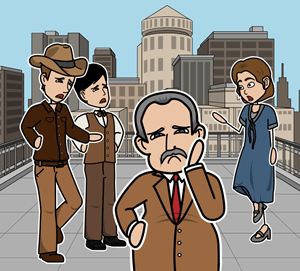Death of a Salesman - Symbols

You can find this storyboard in the following articles and resources:

Death of a Salesman by Arthur Miller
Lesson Plans by Rebecca Ray
Death of a Salesman is a play written and set during 1949. Arthur Miller used his play to represent a social drama and tragedy embodying the unattainable and elusive American Dream. His protagonist, Willy Loman, is a salesman whose disillusionment ends with his suicide.
'
Storyboard Description
Death of a Salesman Symbolism
Storyboard Text
- Exotic Places
- EXAMPLE
- EXAMPLE CONTINUED
- To Willy, places like Alaska, the Jungle, and the Wild West represent the untapped potential and ambitions of a better life.
- His father found success in Alaska, and his brother Ben became rich in Africa, and he had high ambitions for Biff out west. For Willy, these exotic places were an escape from his hackneyed life in New York.
- The Home
- Throughout the play, many aspects of the home are mentioned. Owning your home and providing for your family are key components of the American Dream. For Willy, it is a constant struggle; he can barely afford to keep his appliances.
- Even when he attempts to commit suicide by inhaling gas, he abandons the attempt after realizing his family needs it to heat the house, again showing his need to provide for the home.
- Stockings
- In the play, Willy purchases a pair of new stockings for his mistress while his wife is forced to sew hers because they cannot afford a new pair.
- This symbol not only serves as a reminder of Willy's infidelity, but also his failure to provide as a good husband to his wife and family.
Over 30 Million Storyboards Created







